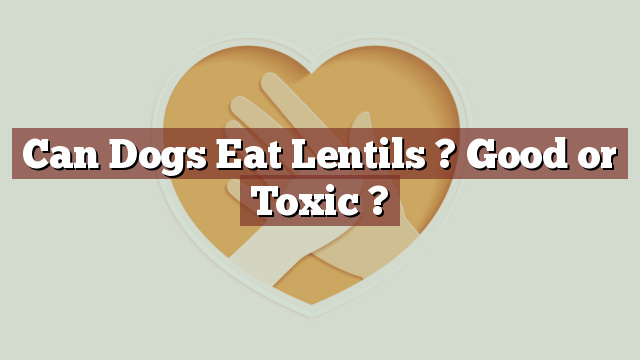Can Dogs Eat Lentils? Good or Toxic?
Feeding our pets the right kind of food is crucial to their overall health and well-being. As responsible dog owners, it is important to understand what foods are safe for our furry friends and what foods can potentially harm them. In this article, we will delve into the topic of feeding lentils to dogs and explore whether they are safe or toxic for our canine companions.
Nutritional Value of Lentils for Dogs: A Comprehensive Analysis
Lentils are a type of legume that are packed with essential nutrients. They are rich in fiber, protein, and various vitamins and minerals. Lentils also contain carbohydrates, which provide dogs with a good source of energy. Additionally, lentils are low in fat, making them a healthy choice for dogs that need to maintain a balanced diet.
Can Dogs Eat Lentils? Unveiling the Truth About Their Safety and Toxicity
Can dogs eat lentils? The answer is yes. Lentils are safe for dogs to consume in moderation. However, it is important to prepare lentils properly before feeding them to your four-legged friend. Uncooked lentils can be difficult for dogs to digest and may cause gastrointestinal issues. Therefore, it is recommended to cook lentils thoroughly and avoid adding any seasoning or spices that could be harmful to dogs, such as onions or garlic.
Scientific studies and veterinary insights have indicated that lentils are not toxic to dogs when prepared appropriately. However, it is worth noting that some dogs may have individual sensitivities or allergies to legumes, including lentils. Therefore, it is always advisable to introduce new foods gradually into your dog’s diet and monitor their reaction.
Potential Risks and Benefits of Lentils in a Canine Diet: What Every Dog Owner Should Know
Feeding lentils to dogs can have several potential benefits. The fiber content in lentils can aid in healthy digestion and regulate bowel movements. The protein in lentils contributes to muscle development and repair. Lentils also provide essential vitamins and minerals, such as iron and folate, which are vital for your dog’s overall health.
However, it is important to be aware of potential risks associated with feeding lentils to dogs. Some dogs may experience flatulence or an upset stomach when introduced to lentils. It is also crucial to remember that lentils should be given in moderation as part of a balanced diet. Overfeeding lentils or any other food can lead to obesity and other health issues in dogs.
My Dog Ate Lentils: Steps to Take and Warning Signs to Look Out For
If your dog accidentally consumes lentils or if you have intentionally fed them lentils, there are a few steps you can take to ensure their well-being. Firstly, observe your dog for any unusual symptoms or signs of discomfort, such as vomiting, diarrhea, or lethargy. If you notice any concerning symptoms, it is recommended to contact your veterinarian for guidance.
Additionally, if you have fed your dog lentils as a new food, monitor their reaction and introduce it gradually into their diet. This will help you identify any potential allergies or sensitivities your dog may have to lentils or legumes in general.
Conclusion: Making an Informed Decision About Feeding Lentils to Your Beloved Canine
In conclusion, lentils can be a nutritious addition to your dog’s diet when prepared properly and fed in moderation. They offer various health benefits, including fiber, protein, and essential vitamins and minerals. However, it is crucial to monitor your dog’s reaction and consult with your veterinarian before introducing any new food into their diet, especially if your dog has known allergies or sensitivities.
Remember, the well-being and safety of our furry friends should always be our top priority. By understanding the nutritional value and potential risks of lentils, we can make informed decisions about what foods are best suited for our beloved canines.
Thank you for investing your time in exploring [page_title] on Can-Eat.org. Our goal is to provide readers like you with thorough and reliable information about various dietary topics. Each article, including [page_title], stems from diligent research and a passion for understanding the nuances of our food choices. We believe that knowledge is a vital step towards making informed and healthy decisions. However, while "[page_title]" sheds light on its specific topic, it's crucial to remember that everyone's body reacts differently to foods and dietary changes. What might be beneficial for one person could have different effects on another. Before you consider integrating suggestions or insights from "[page_title]" into your diet, it's always wise to consult with a nutritionist or healthcare professional. Their specialized knowledge ensures that you're making choices best suited to your individual health needs. As you navigate [page_title], be mindful of potential allergies, intolerances, or unique dietary requirements you may have. No singular article can capture the vast diversity of human health, and individualized guidance is invaluable. The content provided in [page_title] serves as a general guide. It is not, by any means, a substitute for personalized medical or nutritional advice. Your health should always be the top priority, and professional guidance is the best path forward. In your journey towards a balanced and nutritious lifestyle, we hope that [page_title] serves as a helpful stepping stone. Remember, informed decisions lead to healthier outcomes. Thank you for trusting Can-Eat.org. Continue exploring, learning, and prioritizing your health. Cheers to a well-informed and healthier future!

